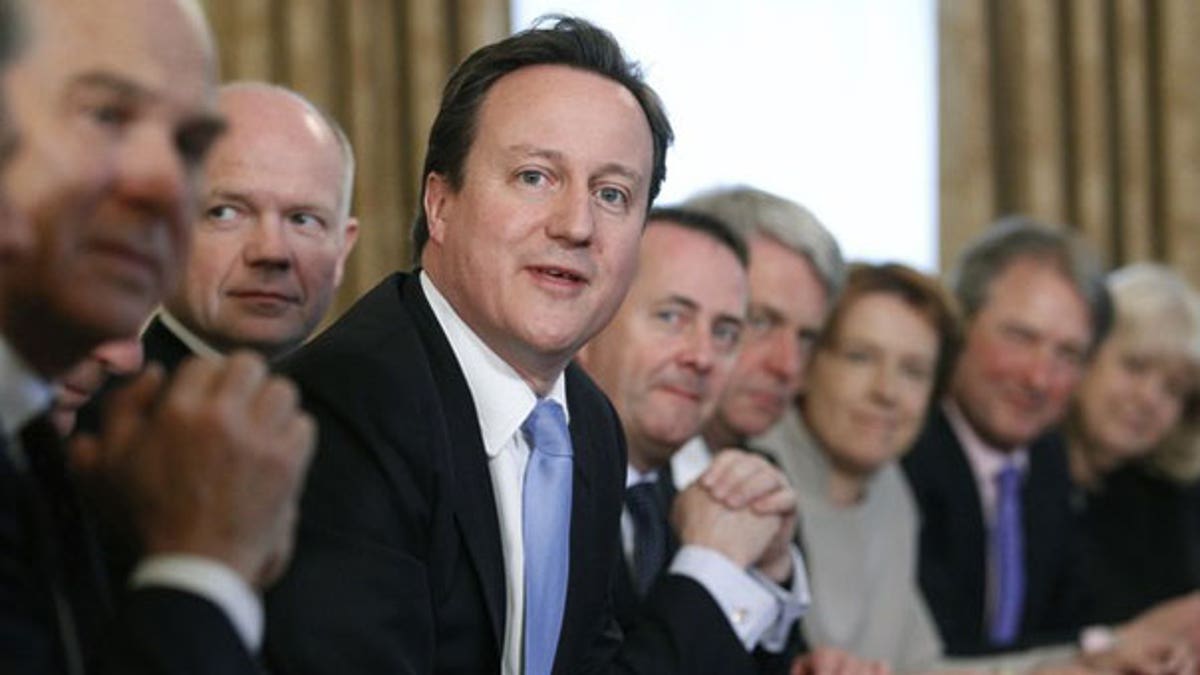
May 13: Britain's Prime Minister, David Cameron, center, leads his first cabinet meeting at number 10 Downing Street in London. (2010 Getty Images)
LONDON -- Britain's new coalition government held its inaugural meeting Thursday, with members of once-rival parties sitting around the Cabinet table together for the first time in decades.
Conservative Prime Minister David Cameron presided over the gathering, sitting across from his deputy, Liberal Democrat leader Nick Clegg.
There are 18 Conservative ministers and five Liberal Democrats in the new Cabinet. The two parties forged a coalition government -- Britain's first since World War II -- after last week's national election produced a hung Parliament, in which no party has an overall majority. The Tories won 306 of the 650 House of Commons seats, the Labour Party 258 and the Lib Dems 57.
Among the first acts of the new Cabinet, which has said deficit-cutting is its top priority, was agreeing to take a 5 percent pay cut and subsequent five-year salary freeze that the government says will save taxpayers 300,000 pounds ($450,000) a year. The move leaves the prime minister's annual salary at 142,000 pounds, plus 65,000 pounds for sitting as a lawmaker. Other ministers get slightly less.
Most of the new ministers emerged from Thursday morning's meeting in 10 Downing St. smiling.
"It went very well," said Education Secretary Michael Gove. "I was delighted by the sense of partnership and common purpose."
"It's like we'd been working together for years," said Work and Pensions Secretary Iain Duncan Smith.
The right-of-center Conservatives and the center-left Lib Dems have hammered out a policy agreement with compromises on both sides. The third-place Lib Dems get moves toward the electoral reform they have long cherished, while the Tories retain key platform planks including an annual cap on immigration and cuts to public spending to reduce Britain's ballooning deficit.
Duncan Smith said the government's main task was "to get the economy back on track."
A BBC survey of economists who advise the Treasury department found Thursday that most are predicting that the government will raise sales taxes to slash the record $236 billion deficit.
Most of those questioned predicted an increase in value added tax from its current 17.5 percent to 20 percent before the end of 2011.
Before the election, neither party had refused to rule out the tax increase on goods and services.
Cameron and Clegg have also pledged sweeping reforms to Parliament, civil liberties laws and ties to Europe.
The Labour Party, relegated to opposition after 13 years in power, is facing a leadership contest following the resignation of former Prime Minister Gordon Brown. So far only ex-Foreign Secretary David Miliband has announced his candidacy, but others are expected to follow -- including, perhaps, Miliband's younger brother Ed.
